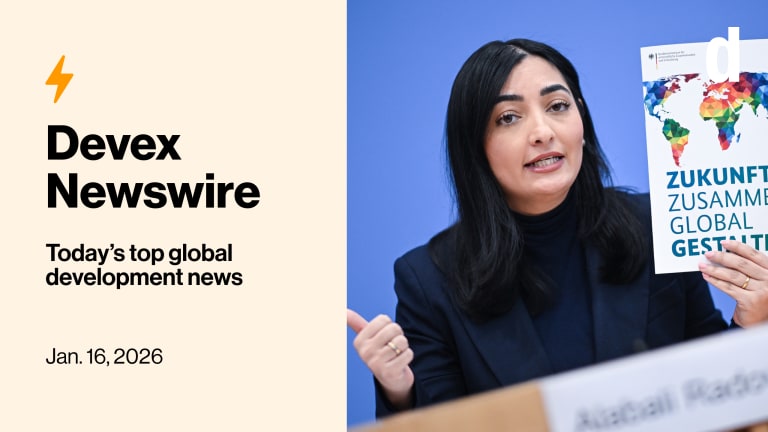
LONDON — The United Kingdom’s Department for International Development has come under fire from the aid sector for signing a 100 million British pound ($138.45 million) aid partnership with Saudi Arabia’s development arm.
The deal, announced by DFID during Crown Prince Mohammed bin Salman’s visit to London last week, was quickly denounced by NGOs and opposition politicians. Kate Osamor, the shadow international development secretary, said the move allowed the Saudi government to “whitewash” its reputation and role in the Yemen war.
Riyadh looks across the Red Sea: What Saudi investors could mean for Africa
African investors, businessmen, and entrepreneurs joined the launch event for Saudi Arabia's sovereign wealth fund seeking opportunities and ways to attract new Gulf investment for the continent's development.
DFID said the partnership with the Saudi Fund for Development, which focuses on development rather than humanitarian work, will seek to build infrastructure in drought and conflict-stricken countries, especially in Africa.
In a statement, it said the partnership would see “British development experts working closer with Saudi counterparts, including in the Horn and East of Africa where both countries are already helping to lift people out of poverty.” It involves a joint commitment of 100 million pounds “to further these efforts,” which includes allocations from the U.K.’s existing country budgets.
However, the countries also signed a joint memorandum of understanding “recognizing the collaboration between DFID and KS Relief [Saudi Arabia’s humanitarian arm] to strengthen both countries’ humanitarian efforts.”
Saudi Arabia has been criticized for its role in the ongoing Yemeni conflict. A Saudi-backed coalition is accused of killing thousands of civilians in airstrikes, and of imposing a blockade on Yemen’s air, sea, and land borders which has prevented much-needed aid from entering the country. The United Nations has described the situation as “catastrophic,” estimating that 22.2 million Yemenis are in need of aid and protection.
“The U.K. government doesn’t seem to have included the Yemen war in the discussion. If you’re having a discussion about humanitarian assistance … this should have been a top priority that the Saudi-led coalition abides by international humanitarian law in Yemen.”
— Sherine El Taraboulsi-McCarthy, research fellow at the Overseas Development InstituteThe U.K. government has also been criticized for continuing to sell weapons to Saudi Arabia. On Friday, it took steps toward the sale of 48 Typhoon fighter jets to the Gulf state, sparking further criticism.
DFID said it was “encouraged by the easing of restrictions into Yemen,” adding that “there is no excuse to prevent humanitarian and commercial supplies from reaching those in need.”
Sherine El Taraboulsi-McCarthy, a research fellow at the Overseas Development Institute who recently authored a report on Saudi Arabia’s humanitarian action, said any aid partnership with the country would be “cosmetic” unless it included measures to reform its activities in Yemen.
“The U.K. government doesn’t seem to have included the Yemen war in the discussion. If you’re having a discussion about humanitarian assistance … this should have been a top priority that the Saudi-led coalition abides by international humanitarian law in Yemen … but this has not been the case.”
Taraboulsi-McCarthy also said the partnership will be used by Saudi “to rectify its image,” and that it failed to acknowledge the need for reforms to Saudi development and humanitarian policies more broadly, as well as to the country’s own “state structures.”
“There is yet to be seen real structural shifts within Saudi Arabia itself toward reform, be it development, humanitarian or even state reform within the country itself,” she said.
“Unless their partnership with the British government also includes some form of structural shift within the Saudi government itself, any collaboration will be cosmetic.”
NGOs including Save the Children, which operates in Yemen, pointed to a contradiction between the partnership and plans to sell fighter jets to the Saudi military.
“How does the U.K. justify selling more weapons to a country that has been listed on the United Nations’ ‘list of shame’ for grave violations against children?” the NGO said in a statement, adding that “Britain has both moral and legal obligations to use its close relationship with Saudi Arabia to ensure that weapons aren’t being used indiscriminately.” No such guarantees appear be on the table, it said.
International Development Secretary Penny Mordaunt has described the partnership as a way of “sharing the best of British expertise” with the Saudis and that the two governments’ “collective efforts will help create jobs and livelihoods to support the poorest people.”
However, Mordaunt has previously criticized the country for blocking aid to Yemen, warning that the use of “starvation as a weapon of war” is in breach of international humanitarian law.
Saudi Arabia’s humanitarian assistance has been growing exponentially in recent years, now measuring 12th in the world in terms of aid as a percentage of gross national income. Facing an ever-larger humanitarian financing gap, the role of “emerging” Gulf donors such as Saudi Arabia is significant.
Under Crown Prince Mohammed bin Salman, the country has been pushing a reform agenda, Vision 2030, which includes social and aid reforms among other things. It has issued a new aid plan for Yemen — the Yemen Comprehensive Humanitarian Operations — which appears to recognize some of the concerns about Saudi’s aid policy in Yemen, although some observers have described it as more aspirational than practical.
“The Yemen Comprehensive Humanitarian Operations is forward-looking and responsive to concerns about humanitarian aid in the country. Countries within the Saudi-led coalition are among the highest contributors of humanitarian and development aid to Yemen, and this new plan reiterates their commitment to bringing needed food, medicine, humanitarian assistance, and fuel supplies to the people of Yemen,” the document states.
In February, the country also hosted a humanitarian forum in its capital Riyadh, which was attended by representatives of major international actors including U.N. agencies, donors, and NGOs.
While ODI’s Taraboulsi-McCarthy welcomed talk of reform, she said that recent incidents revealed a “disconnect between the narrative and the realities on the ground.”
Search for articles
Most Read
- 1
- 2
- 3
- 4
- 5








